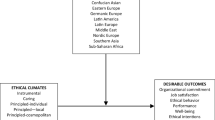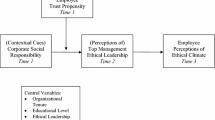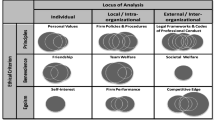Abstract
This study examines perceptions of ethical climate and ethical practices in a sample of Polish organizations and the relationship between ethical climate and behaviors believed to be associated with successful managers. A survey of Polish managerial employees (N = 200) indicated that “efficiency” was the most reported, and “professionalism” was the least reported ethical climate type. A majority of the respondents (61.5 %) perceived successful managers as being ethical, and in particular, those that believed that their organization had a “professionalism” and “independence” climate perceived a strong positive link between success and ethical behavior. Implications of these findings are then discussed.
Similar content being viewed by others
References
Ahmed, M. M., Chung, K. Y., & Eichenseher, J. W. (2003). Business students’ perceptions of ethics and moral judgment: A cross-cultural study. Journal of Business Ethics, 43, 89–102.
Bulutlar, F., & Öz, E. U. (2009). The effects of ethical climates on bullying behavior in the workplace. Journal of Business Ethics, 86, 275–295.
Carroll, S. J., & Gannon, M. J. (1997). Ethical dimensions of international business. Thousand Oaks: Sage.
Cooper, R. W., & Dorfman, M. S. (2003). Business and professional ethics in transitional economies and beyond: Considerations for the insurance industries of Poland, the Czech Republic and Hungary. Journal of Business Ethics, 47, 381–392.
Cullen, J. B., Parboteeah, K. P., & Victor, B. (2003). The effects of ethical climates on organizational commitment: A two-study analysis. Journal of Business Ethics, 46, 127–141.
Cullen, J. B., Victor, B., & Bronson, J. W. (1993). The ethical climate questionnaire: An assessment of its development and validity. Psychological Reports, 73, 667–674.
Deshpande, S. P. (1996a). The impact of ethical climate types on facets of job satisfaction: An empirical investigation. Journal of Business Ethics, 15, 655–660.
Deshpande, S. P. (1996b). Ethical climate and the link between success and ethical behavior: An empirical investigation of a non-profit organization. Journal of Business Ethics, 15, 315–320.
Deshpande, S. P., George, E., & Joseph, J. (2000). Ethical climates and managerial success in Russian Organizations. Journal of Business Ethics, 23, 211–217.
Deshpande, S. P., & Joseph, J. (2009). Impact of emotional intelligence, ethical climate, and behavior of peers on ethical behavior of nurses. Journal of Business Ethics, 85, 403–410.
Deshpande, S. P., Joseph, J., & Shu, X. (2011). Ethical climate and managerial success in China. Journal of Business Ethics, 99, 527–534.
Diacon, S. R., & Ennew, C. T. (1996). Can business ethics enhance corporate governance? Evidence from a survey of UK executives. Journal of Business Ethics, 15, 623–634.
Elci, M., & Alpkan, L. (2009). The impact of perceived organizational ethical climate on work satisfaction. Journal of Business Ethics, 84, 297–311.
Erondu, E. A., Sharland, A., & Okpara, J. O. (2004). Corporate ethics in Nigeria: A test of the concept of an ethical climate. Journal of Business Ethics, 51, 349–357.
Fan, P., & Zigang, Z. (2004). Cross-cultural challenges when doing business in China. Singapore Management Review, 26(1), 81–90.
Fritzche, D. J., & Becker, H. (1984). Linking management behavior to ethical philosophy. Academy of Management Journal, 27, 166–175.
Hunt, S. D., Chonko, L. B., & Wilcox, J. B. (1984). Ethical problems of marketing researchers. Journal of Marketing Research, 21, 309–324.
Jacobsen, G. (2010). Poland - twenty years with market economy. International Business & Economics Research Journal, 9, 1–14.
Kim, N. Y., & Miller, G. (2008). Perceptions of the ethical climate in the Korean tourism industry. Journal of Business Ethics, 82, 941–954.
Kohlberg, L. (1984). The philosophy of moral development. New York: Harper and Row.
Padelford, W., & White, D. W. (2010). The influence of historical socialism and communism on the shaping of a society’s economic ethos: An exploratory study of Central and Eastern Europe. Journal of Business Ethics, 97, 109–117.
Parboteeah, K. P., Cullen, J. B., Victor, B., & Sakano, T. (2005). National culture and ethical climates: A comparison of U.S. and Japanese accounting firms. Management International Review, 45, 459–481.
Parboteeah, K. P., & Kapp, E. A. (2008). Ethical climates and workplace safety behaviors: An empirical investigation. Journal of Business Ethics, 80, 515–529.
Ryan, L. V. (2006). Current ethical issues in Polish HRM. Journal of Business Ethics, 66, 273–290.
Schneider, B. (1975). Organizational climate: An essay. Personnel Psychology, 36, 447–479.
Swiss Re. (2001). Insurance industry in Central and Eastern Europe. Sigma, 1.
Tsai, M.-T., & Huang, C.-C. (2008). The relationship among ethical climate types, facets of job satisfaction and the three components of organizational commitment: A study of nurses in Taiwan. Journal of Business Ethics, 80, 565–581.
Tsalik, J., & Seaton, B. (2008). Consumer perceptions of business ethical behavior in former eastern block countries. Journal of Business Ethics, 82, 919–928.
Valentine, S. R., & Rittenburg, T. L. (2004). Spanish and American business professionals’ ethical evaluations in global situations. Journal of Business Ethics, 51, 1–14.
Vardi, Y. (2001). The effects of organizational and ethical climates on misconduct at work. Journal of Business Ethics, 29, 325–337.
Victor, B., & Cullen, J. B. (1987). A theory and measure of ethical climate in organizations. In W. C. Frederick & L. E. Preston (Eds.), Business ethics: Research issues and empirical studies (pp. 77–97). Greenwich: JAI Press.
Victor, B., & Cullen, J. B. (1988). The organizational bases of ethical work climate. Administrative Science Quarterly, 33, 101–125.
Vitell, S. J., & Davis, D. L. (1990). Ethical beliefs of MIS professionals: The frequency and opportunity for unethical behavior. Journal of Business Ethics, 9, 63–70.
Williams, B. (1985). Ethics and the limits of philosophy. Cambridge: Harvard University Press.
Wimbush, J. C., & Shepard, J. M. (1994). Toward an understanding of ethical climate: Its relationship to ethical behavior and supervisory influence. Journal of Business Ethics, 13, 637–647.
Author information
Authors and Affiliations
Corresponding author
Appendix
Rights and permissions
About this article
Cite this article
Simha, A., Stachowicz-Stanusch, A. The Link Between Ethical Climates and Managerial Success: A Study in a Polish Context. J Bus Ethics 114, 55–59 (2013). https://doi.org/10.1007/s10551-012-1325-3
Received:
Accepted:
Published:
Issue Date:
DOI: https://doi.org/10.1007/s10551-012-1325-3




